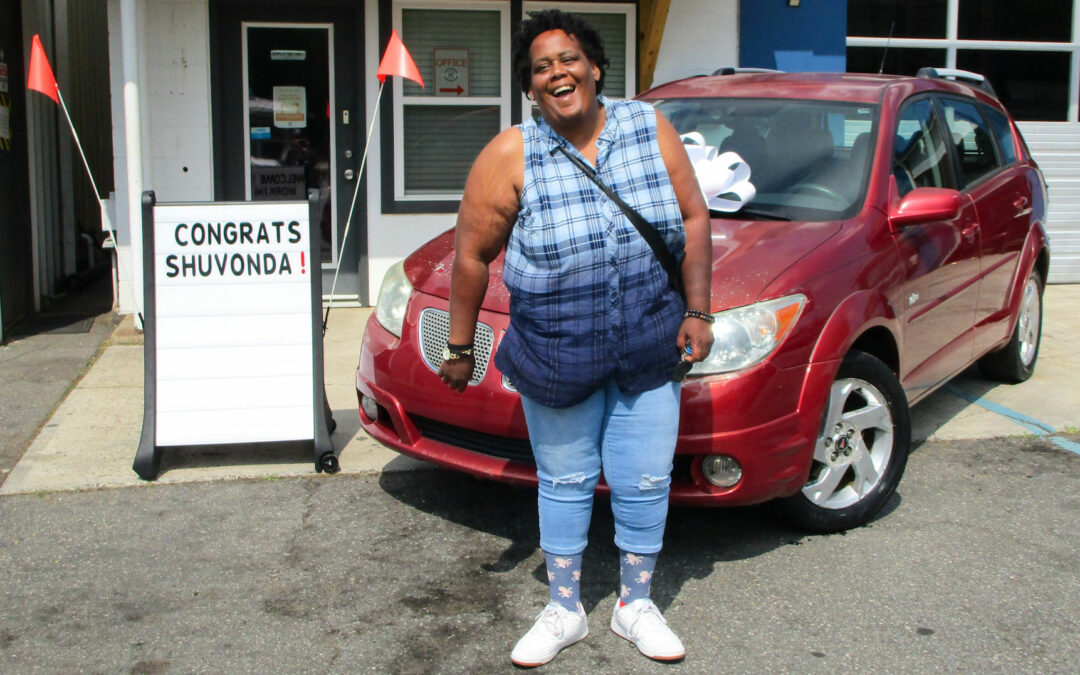By Bill Graham
Shuvonda Harper is a social justice doula.
A voice for the voiceless, she spends long days in support of her community. Her work with the Asheville Housing Authority, the YMI Cultural Center, and the Center for Participatory Change is all in an effort to make “good trouble” for Asheville and Buncombe County residents.
In addition, Shuvonda is a co-founder of the Southside Community Farm, an eight-year-old urban farm in Asheville from which staff and volunteers harvested and distributed 1,979 pounds of produce to the community this year alone.
But for a long while Harper was trying to do all these things with no car, and for her that amounted to just plain old everyday trouble.
As a single mother of two teens, she had parent-taxi duties and school events heaped atop of all her other getting-around needs, and as her responsibilities in the community grew her transportation worries expanded to match. Her work was more rewarding than profitable, and transportation problems continued to slow her down.
In 2022, the YMI Cultural Center referred her to Working Wheels, an Asheville-based non-profit that provides safe, reliable, and affordable transportation to economically vulnerable individuals and families, helping them toward financial security and improved quality of life. Working Wheels opened its doors in 2015.
Harper went through the application process with Working Wheels, waited her turn in line, and eventually had the chance to buy a deeply-discounted pre-owned Pontiac Vibe.
“I feel privileged to be a participant in the [Working Wheels] program,” she says. “They gave me a chance to be where I needed to be for my children and to do the work I was doing.”
That work now includes delivering food for the garden, and sometimes shuttling elderly residents to healthcare appointments and for shopping runs. Like many communities, the Southside neighborhood where she grew up has become isolated from shopping and other services as suburban development and gentrification took their toll.
“Sometimes people have to catch a couple of buses to get groceries or go out to the VA Hospital, which can add hours to their trip,” Harper says. “That can be hard for older people, so sometimes I just offer that support of transportation.”
The dynamic she describes is one Working Wheels deals with every day, across the age spectrum. In Buncombe County especially, the people who most need public transportation or to keep their transportation budget low can hardly afford to live in neighborhoods that make that possible.
“I feel privileged to be a participant in the [Working Wheels] program,” she says. “They gave me a chance to be where I needed to be for my children and to do the work I was doing.”
The problem compounds itself when expensive car repairs crop up. Broad studies have shown that as many as 40% of adults were one $400 financial setback away from being unable to pay their monthly bills.
Along with the Vehicle Purchase Program that benefited Harper, Working Wheels offers a Vehicle Repair Program that provides deeply discounted vehicle repairs for people who cannot afford to repair a vehicle they already own. Working Wheels partners with local non-profit organizations to choose participants for both programs. Case managers of collaborating organizations are experts in their fields and choose from among their clients to determine the greatest need and a client’s capacity for success.
The program will serve 245 clients in 2023 – about 20 per month – and will expand considerably in 2024.
Meanwhile, Harper and the Southside Community Farm continue to make strides. She grew up in the historically African-American Southside neighborhood, and after some time away from Asheville, she felt a calling to work in her home community.
She lent her talents to the rejuvenation of the Arthur R. Edington Center in Southside, and by extension the nearby garden. The farm seeks to encourage neighborhood food sovereignty through food distribution, environmental education, racial justice, and connection with the land.
“Our first year was rough,” Harper remembers. “We had to carry water from a cistern across the street.”
After that year, the Asheville Housing Authority installed a pump, the garden began to take hold and soon the orchard did, too. Now the farm is a flourishing enterprise that produced 6,200 servings of fruit and vegetables in its most recent growing season, 75% of which went to free distribution programs. There’s also a “Free Fridge” – part of a larger national movement to provide free perishable foods – and a monthly farmer’s market in-season.
Harper considers the interconnections between community organizations like Working Wheels, Southside Community Farm, and the YMI Cultural Center to be mutually enhancing in a variety of ways, and hopes to donate a vehicle back to Working Wheels at some point to keep the ball rolling.
Do you have an old car that needs a new home? Please consider donating it to Working Wheels. We make the process quick and simple, we welcome vehicles in any condition, and we offer free towing!
Working Wheels provides affordable and reliable transportation options to working families in need in Western North Carolina. Car donations are used to change lives for the better and help clients gain access to transformational opportunities including education, employment, and access to healthcare. For more information on Working Wheels, visit workingwheelswnc.org or call (828) 633-6888.

